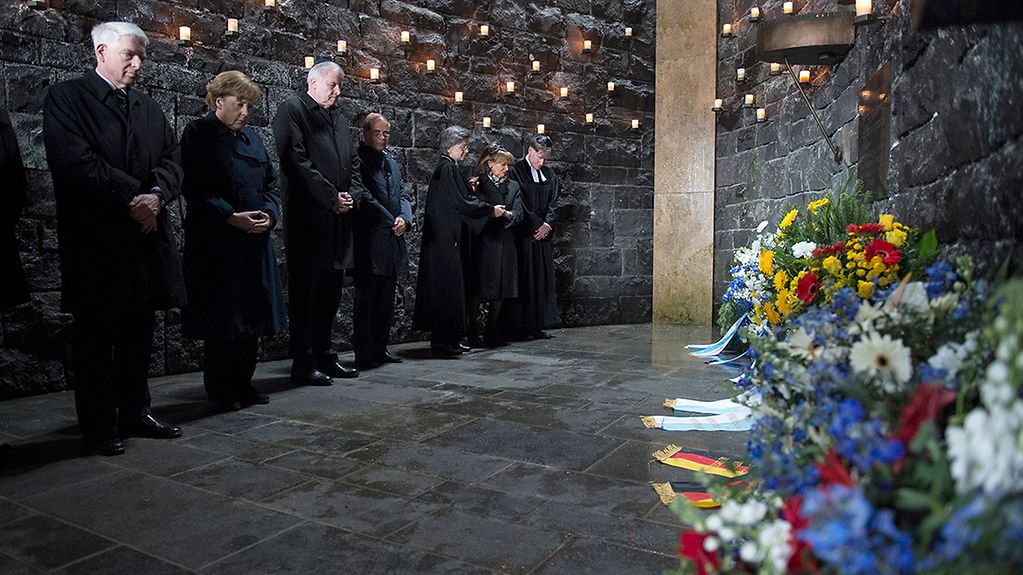70th Anniversary of Liberation of Dachau
“No, we will not forget!” stressed German Federal Chancellor Merkel on the 70th anniversary of liberation of the Dachau concentration camp. Remembering the atrocities committed by the Nazi regime is a duty that we owe the future, according to Merkel.
3 min reading time

From remembrance arises responsibility for the future
Photo: BPA/Bergmann
German Federal Chancellor Angela Merkel took part in the commemoration ceremony on the liberation of the Dachau concentration camp from 70 years ago. Together with camp survivors and US Army soldiers, she remembered the victims of the Nazi regime. Survivors of the concentration camp provided moving accounts of their experiences. The Chancellor expressed her deep gratitude to them.
Keeping the memory alive
“It is extremely fortunate that people like you are willing to share your life stories with us. The boundless suffering inflicted on you by Germany during the Nazi era is essentially beyond our comprehension.” This makes the survivors' accounts even more important. “Because they at least make an approximate understanding of events possible,” said Merkel.
The voices of the survivors will make it clear to all of us, especially the younger generation, how important it is to keep the memory alive. Merkel added: “The vivid descriptions especially help young people to associate bare facts and figures with individual life paths.” These are “a memory that the future is obliged to preserve”.
Fighting anti-Semitism
Anti-Semitic views are widespread at present, complained Merkel. We should “actively look and listen”. We must not close our eyes to anti-Semitic hate speeches and attacks or terrorist strikes. Merkel said: “We are called upon to make clear to ourselves that Jewish life is part of our identity, that discrimination, ostracism and anti-Semitism can have no place among us, that they must be fought with determination and the full force of the law”.
The chancellor also warned that it is not only a state duty, but also a civilian duty, to tackle anti-Semitism. “We owe it to all the victims of national socialism”, said Merkel.
Places of learning for future generations
Merkel praised the work of all employees of concentration camp memorial sites: “As places of learning for future generations, you carry the burden of ensuring that the knowledge of what happened is kept alive and passed on”. As such, the memorial sites make a contribution to education and democracy, emphasized the Chancellor. Merkel said: “We must work together so that especially young people do not feel addressed by extremist recruiters”.
Concentration camps remind us not to forget. The Chancellor declared: “No, we will not forget! We will remember – for the sake of the victims, for our own sake, and for the sake of the coming generation.”
Dachau concentration camp memorial site
In the Dachau concentration camp, more than 200,000 people from throughout Europe were imprisoned between 1933 and 1945. Tens of thousands did not survive. Dachau served as a model for later concentration camps during the national socialist reign of terror. On 29 April, US troops liberated the concentration camp.
The Dachau concentration camp memorial site was established in 1965, at the initiative of and with the help of the surviving prisoners. Today, approximately 800,000 people visit the memorial site each year, including many young people.
The memorial site is part of the “Stiftung Bayerische Gedenkstätten” (Foundation for Bavarian Memorial Sites). Since 2009, it has received a permanent annual subsidy of €700,000 from the federal government. The federal government has also provided financial support for individual construction and exhibition projects, such as the visitors' centre or the permanent exhibition.